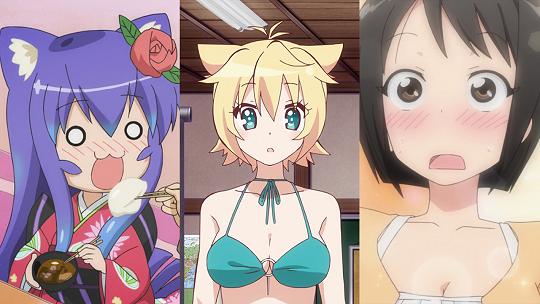Thoughts on "slice of life" shows

“Ugh, nothing happens!” is one of the oft uttered arguments against contemporary, character-led light comedies or, more colloquially, “slice of life” series. In a sense it is largely true; nothing burns, dies, transforms, flies, barrel rolls, crashes, magically disappears, is chased or otherwise suddenly explodes in slice of life series. It’s an argument that’s largely missing the point though, for as mercurial as the definition of “slice of life” is, the focus is largely on presenting an exaggerated take on the mundanity of everyday life. This is to say nothing of the contentiousness of the phrase and its taxonomic convention, carrying as it does aging volumes of discussion, regardless of the term’s demotic usage.
just a peaceful amble [...] with copious hair brushing and peculiar banter
Three recent (ish) anime which typify the spirit, if not the minutiae, of the term include Acchi Kocchi (Place to Place), GJ-bu (GJ club) - both of which peer into the lives of middle/high-school students - and Servant × Service (or to give it its full title Servant × Service ☑) which deals with the rarely seen world of an entry level Japanese government employee. It is perhaps fair to say though that the success of such a series largely relies upon the personalities of the characters and the ability to keep either the comedy or the drama fresh enough across its run.
Read the rest of this entry




It's hard to describe Lucky Star without using words such as "meta" or "proto", or comparing it to similar all-female high-school comedies such as Azumanga Daioh or School Rumble or perhaps drifting into expletives about the circular Suzumiya Haruhi references by Kyoto Animation. The concept to take away from Lucky Star is that it is relevant to compare it to all of these things, and brutally unfair.
some of the late-to-the-party characters seem ignored compared to the tried and tested Kagami x Konata tiffs
Lucky Star shines because it manages to not so much parody but lampoon modern otaku and anime by, paradoxically, being a fan pandering anime itself. The first episode was divisive in that many wrote off the long soliloquies as boring or blatantly obvious as to their purpose, this weaned off the Haruhi refugees like a brick wall. In retrospect the meandering script changed little in delivery or tone from the last episode to the first episode, unlike the aesthetics which, while universally well animated, showed how much the animators settled in to drawing the characters. The first episode did brilliantly in laying down the foundation of the rest of the series, characters were expanded upon and new ones introduced, but the humour and pacing remained.
Read the rest of this entry




